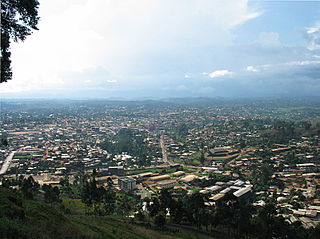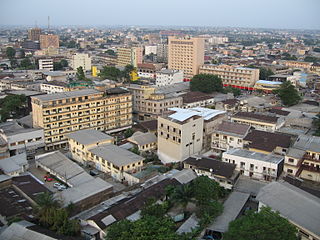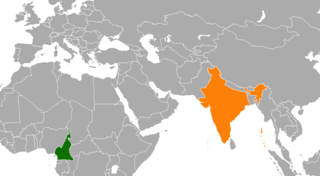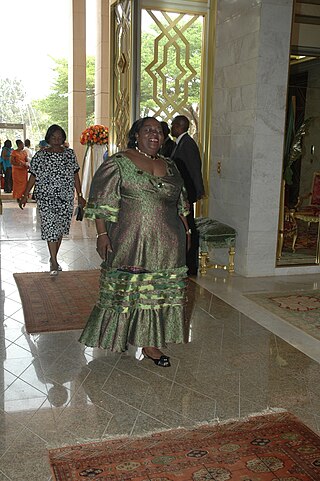Related Research Articles

Cameroon, officially the Republic of Cameroon, is a country in Central Africa. It shares boundaries with Nigeria to the west and north, Chad to the northeast, the Central African Republic to the east, and Equatorial Guinea, Gabon and the Republic of the Congo to the south. Its coastline lies on the Bight of Biafra, part of the Gulf of Guinea and the Atlantic Ocean. Due to its strategic position at the crossroads between West Africa and Central Africa, it has been categorized as being in both camps. Its nearly 27 million people speak 250 native languages, in addition to the national tongues of English and French, or both.
At the crossroads of West Africa and Central Africa, the territory of what is now Cameroon has seen human habitation since some time in the Middle Paleolithic, likely no later than 130,000 years ago. The earliest discovered archaeological evidence of humans dates from around 30,000 years ago at Shum Laka. The Bamenda highlands in western Cameroon near the border with Nigeria are the most likely origin for the Bantu peoples, whose language and culture came to dominate most of central and southern Africa between 1000 BCE and 1000 CE.

The economy of Cameroon was one of the most prosperous in Africa for a quarter of a century after independence. The drop in commodity prices for its principal exports – petroleum, cocoa, coffee, and cotton – in the mid-1980s, and economic mismanagement, led to a decade-long recession. Real per capita GDP fell by more than 60% from 1986 to 1994. The current account and fiscal deficits widened, and foreign debt grew. Yet because of its oil reserves and favorable agricultural conditions, Cameroon still has one of the best-endowed primary commodity economies in sub-Saharan Africa.
Duala is a dialect cluster spoken by the Duala and Mungo peoples of Cameroon. Douala belongs to the Bantu language family, in a subgroup called Sawabantu. It is a tonal language with subject–verb–object word order. Maho (2009) treats Douala as a cluster of five languages: Douala proper, Bodiman, Oli, Pongo and Mongo. He also notes a Douala-based pidgin named Jo.

Yaoundé is the capital of Cameroon and, with a population of more than 2.8 million, the second-largest city in the country after the port city Douala. It lies in the Centre Region of the nation at an elevation of about 750 metres (2,500 ft) above sea level.
Makossa is a Cameroonian style of urban music. Like much other late 20th century music of Sub-Saharan Africa, it uses strong electric bass rhythms and prominent brass. In the 1980s makossa had a wave of mainstream success across Africa and to a lesser extent abroad.

Bamenda, also known as Abakwa and Mankon Town, is a city in northwestern Cameroon and capital of the Northwest Region. The city has a population of about 2 million people and is located 366 km (227 mi) north-west of the Cameroonian capital, Yaoundé. Bamenda is known for its cool climate and scenic hilly location.
Articles related to Cameroon include:

Bafut is a town located in a modern commune in Cameroon, it is also a traditional fondom. It is located in the Mezam Department, which in turn is located in the Northwest Province.

Ismail Serageldin, Founding Director of the Bibliotheca Alexandrina (BA), the new Library of Alexandria, inaugurated in 2002, is currently, Emeritus Librarian, and member of the Board of Trustees of the Library of Alexandria. He serves as Chair or Member of a number of advisory committees for academic, research, scientific and international institutions and civil society efforts, and serves on the Advisory Committee of the World Social Science Report for 2013 and 2016, as well as the UNESCO-supported World Water Scenarios (2013) and the executive council of the Encyclopedia of Life (2010) and Chairs the Executive Council of the World Digital Library (2010). He also co-chaired the African Union's high level panel for Biotechnology (2006) and again for Science, Technology and Innovation (STI) in 2012–2013, and was a member of the ICANN Panel for the review of the internet future (2013).
The InterAcademy Partnership (IAP) is a global network consisting of over 140 national and regional member academies of science, engineering, and medicine. It was founded in 1993 as the InterAcademy Panel (IAP). In 2000, the IAP founded the InterAcademy Council (IAC) and the InterAcademy Medical Panel (IAMP). The partnership was established in 2016 when it merged the three inter-related networks into IAP for Health, IAP for Science, and IAP for Policy.

Douala is the largest city in Cameroon and its economic capital. It is also the capital of Cameroon's Littoral Region. It was home to Central Africa's largest port, now being replaced by Kribi port. It has the countries' major international airport, Douala International Airport (DLA). It is the commercial and economic capital of Cameroon and the entire CEMAC region comprising Gabon, Congo, Chad, Equatorial Guinea, Central African Republic and Cameroon. Consequently, it handles most of the country's major exports, such as oil, cocoa and coffee, timber, metals and fruits. As of 2023, the city and its surrounding area had an estimated population of 5,768,400. The city sits on the estuary of Wouri River and its climate is tropical.

University of Buea (UB) is found in Molyko, Buea, in the southwest region of Cameroon. It was founded as a university centre in 1985 and became a full-fledged university in 1992, following a government decree that re-organized state universities in the country. It is regarded as the best university in Cameroon and is one of two English speaking universities in Cameroon, alongside the University of Bamenda, which follow the British system of education. It serves citizens from both anglophone and francophone regions of Cameroon and from neighboring countries such as Nigeria and Equatorial Guinea.
The University of Dschang is located in the town of Dschang, West Cameroon, about 425 kilometers northwest of Yaoundé. It has its roots in three agricultural training schools, and evolved from an agricultural institution to a university in 1993.

Cameroon–India relations refers to the international relations that exist between Cameroon and India. The High Commission of India in Abuja, Nigeria is concurrently accredited to Cameroon. India also maintains an Honorary Consulate in Douala. Cameroon has no diplomatic mission in India.
In Ivory Coast, a country in West Africa, scientific output has been relatively modest. Scientists in Ivory Coast produced only 10 scholarly articles per million inhabitants in international journals in 2014, compared to a continental average of 20 per million. Between 2008 and 2014, scientists published mostly in biological sciences, followed by medical sciences, geosciences, agriculture and chemistry. The country also has few international collaborations, compared to the rest of the continent: whereas more than eight out of ten articles had a foreign co-author in most countries in 2014, the rate in Ivory Coast was 73%.
Kate Kanyi-Tometi Fotso is a Cameroonian businesswoman who founded the largest cocoa exporter in Cameroon. Fotso, according to Forbes Africa, is the richest woman in Cameroon and the 20th richest person in the African Francophonie.

Narcisse Mouelle Kombi, born on May 6, 1962, in Douala, is a Cameroonian academic and writer. Associate of public law and political science, professor at the University of Yaounde II, he was appointed Minister of Arts and Culture of Cameroon on October 2, 2015 in the government of Philemon Yang.

Françoise Foning was a Cameroonian businessperson and politician for the Cameroon People's Democratic Movement (CPDM). She began a career in business at age 12, opening a restaurant before entering into the tourism, transportation, food, medical and education sectors. Foning became president of CPDM's women's division in 1992 and was appointed the party's leader in Douala and the national committee five years later. In 2002, she was elected deputy mayor of Douala II and began serving in the National Assembly that same year. Foning led the African Network and Cameroonian Businesswomen and consulted The World Bank, the African Development Bank along with several international agencies. She was founding president of the Association of Cameroonian Businesswomen and the NGO World Female Company Managers. A street in Douala was named in her memory.
Ernestine Gwet-Bell is a gynaecologist from Cameroon, who supervised the first successful in vitro fertilisation (IVF) treatment in Cameroon.
References
- ↑ Mbah et al. 2020, p. 133.
- 1 2 3 "Cameroon, Cameroon Academy of Sciences (CAS)". International Science Council. 6 February 2023. Retrieved 8 December 2023.
- 1 2 (IAP), the InterAcademy Partnership (10 November 2014). "Enhancing the Capacity of African Science Academies: The Final Evaluation of ASADI" (PDF). InterAcademy Partnership. Retrieved 8 December 2023.
- 1 2 3 "About". Cameroon Academy of Sciences (in Kinyarwanda). Retrieved 8 December 2023.
- ↑ "ACADEMIE DES SCIENCES DU CAMEROUN". Université de Dschang (in French). 28 November 2016. Retrieved 8 December 2023.